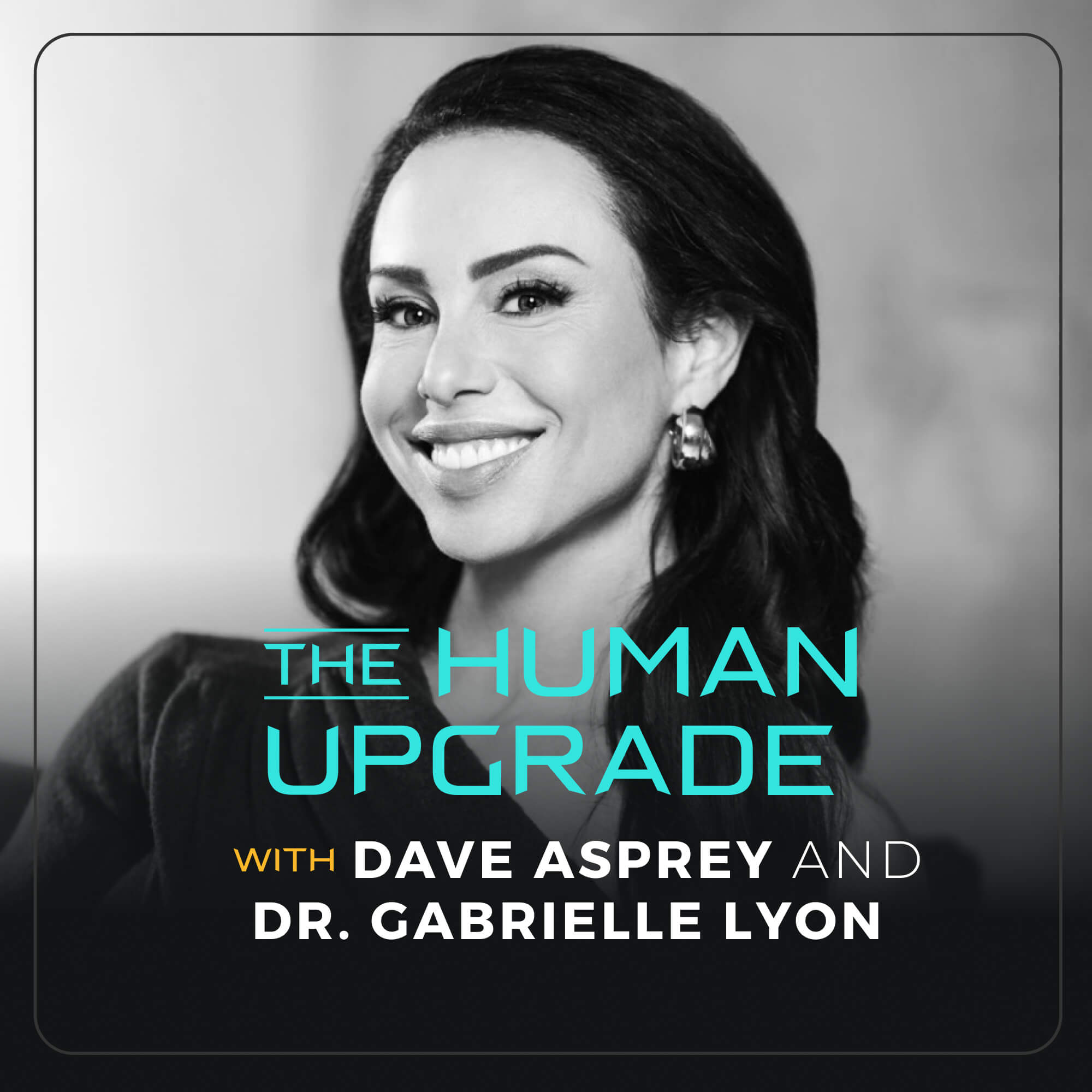
EP 1097
1097. Flex on ‘Em: Why You Should Build Life-Extending Skeletal Muscle Mass
Dr. Gabrielle Lyon joins us to flex her intellectual muscles on healthy protein intake, reframing the hallmarks of aging, unlocking longevity through diet, and more. She’s looking at aging in exciting new ways in her book, Forever Strong, which is packed with science-based strategies for aging well.
Subscribe To The Human Upgrade
In this Episode of The Human Upgrade™...
Today, we cover something that everybody wants at some level or another—muscle. If you want to live a long time and you’ve fallen for the plant based nonsense science that’s out there to sell more Froot Loops, well, you’re heading in the wrong direction from a longevity perspective. The cold, hard truth is that skeletal muscle mass drives longevity.
Dr. Gabrielle Lyon joins the show today to flex her own intellectual muscles on protein intake, reframing the hallmarks of aging, supplementing aminos, healthy fascia, and a whole lot more. You’ve heard her talk about these things online probably as much as I have; she calls what she does Muscle Centric Medicine—and as you can imagine, I am fully on board.
She’s looking at aging in exciting new ways in her new book, Forever Strong, which is packed with science-based strategies for aging well.
We respectfully lock horns on a few subjects near and dear to our hearts—ranging into symptomatology vs. muscle health, key flaws in modern skeletal muscle research, where to draw the line on veganism, unlocking longevity through diet, and more—before landing on our shared responsibility to the greater community to share these insights for the common good.
Dr. Gabrielle Lyon is a true heavyweight in the space and my dear friend, backing up her immense aptitude with real life results as a biohacker seemingly aging at a slower pace than one might expect. It’s a pleasure to welcome her to the show today.
“The idea of reducing dietary protein to dampen mTOR signaling in skeletal muscle makes no sense.”
DR. GABRIELLE LYON
(02:38) Correlation Between Aging & Skeletal Muscle Mass
- Read: Forever Strong by Dr. Gabrielle Lyon
- Dr. Gabrielle’s informed background in geriatric medicine
- Modern symptomatology vs. skeletal muscle health
- Reframing the hallmarks of aging
- 40 Years of Zen
- Gaps in modern skeletal muscle measuring
- A New Whole-Body MRI Scan Sees Everything – Raj Attariwala M.D., Ph.D. #989
- Optimizing genetic potential
- Benefits to weight training as a young person
- How much weight training is ideal?
- Read: The One-Minute Workout by Martin Gibala
- Skeletal muscle as body armor
(23:30) To Protein or Not to Protein? There’s No Question
- Protein intake with regard to longevity
- Mythbusting mechanistic target of rapamycin (mTOR)
- Kevin Hart ends up in wheelchair after being ‘dumbest man alive’
- One possible benefit to animal protein restriction
- Considering protein instead as its 20 amino acids
- Benefits to collagen supplementation
- Read: The Switch by Mr. James W. Clement
- Not-So-Science Fiction: Extending Your Healthspan Gets Real – James Clement #608
(37:29) Applying the Science: Everyday Tips & Practices
- Spacing amino acids throughout the day
- Dr. Lyon’s longevity protocol
- Eating earlier for circadian alignment
- Evidence hedging intermittent fasting
- Negative impact of alcohol on aging
(47:42) Fascia, Muscle & Hernias: What’s the Connection?
- Importance of fascia in aging
- Recommendations to avoid hernia surgery
- Explaining the tensegrity principle as it relates to muscle health
- Value of functional movement practice
- Link between the virus and an increase in mast cells
(50:26) Best Proteins & Why You Shouldn’t Go Vegan
- Dr. Lyon’s recommended animal protein powders
- Why vegan farts are the real problem
- Other important bioavailable nutrients in animal protein
- Veganism in younger/older people
- Wielding the responsibility to educate
- Dave’s health journey and inspiration
- Supplementing amino acids
- Read: Forever Strong by Dr. Gabrielle Lyon
Dave Asprey’s NEW Book ‘Smarter Not Harder’ is out now: https://daveasprey.com/books
Website: drgabriellelyon.com
Read: Forever Strong by Dr. Gabrielle Lyon
Instagram: @drgabriellelyon
Podcast: The Dr. Gabrielle Lyon Show
YouTube: Dr. Gabrielle Lyon
Facebook: Doctor Gabrielle Lyon
Enjoy the show!
LISTEN: “Follow” or “subscribe” to The Human Upgrade™ with Dave Asprey on your favorite podcast platform.
REVIEW: Go to Apple Podcasts at daveasprey.com/apple and leave a (hopefully) 5-star rating and a creative review.
FEEDBACK: Got a comment, idea or question for the podcast? Submit via this form!
SOCIAL: Follow @thehumanupgradepodcast on Instagram and Facebook.
JOIN: Learn directly from Dave Asprey alongside others in a membership group: ourupgradecollective.com.
Subscribe To The Human Upgrade
Similar Episodes

BOOKS
4X NEW YORK TIMES
BEST-SELLING SCIENCE AUTHOR
Smarter
Not Harder
Smarter Not Harder: The Biohacker’s Guide to Getting the Body and Mind You Want is about helping you to become the best version of yourself by embracing laziness while increasing your energy and optimizing your biology.







